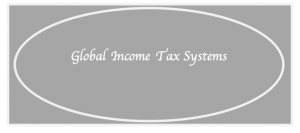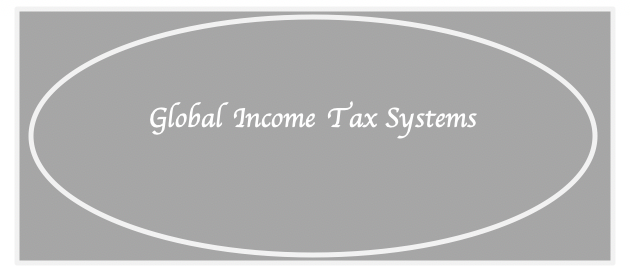INCOME TAX SYSTEMS
Understanding Global Income Tax Systems
 Understanding how and when the United States imposes federal income tax on its U.S. Tax Residents in cross border transactions has long been a source of confusion to U.S. taxpayers. In fact, in some cases, this issue has resulted in taxpayers paying a disproportionate amount of income tax to more than one tax jurisdiction. Likewise, foreign owned companies and individuals who generate revenue in the United States are uncertain as to their U.S. income tax exposure, and in many cases, improperly structure their cross-border transactions. These problems are due, in large part, to the legal complexities associated with cross border transactions, and to a lesser extent, the failure by some tax advisors to familiarize themselves with the U.S. tax laws and tax treaties.
Understanding how and when the United States imposes federal income tax on its U.S. Tax Residents in cross border transactions has long been a source of confusion to U.S. taxpayers. In fact, in some cases, this issue has resulted in taxpayers paying a disproportionate amount of income tax to more than one tax jurisdiction. Likewise, foreign owned companies and individuals who generate revenue in the United States are uncertain as to their U.S. income tax exposure, and in many cases, improperly structure their cross-border transactions. These problems are due, in large part, to the legal complexities associated with cross border transactions, and to a lesser extent, the failure by some tax advisors to familiarize themselves with the U.S. tax laws and tax treaties.
The following discussion will examine the various types of tax systems, the concept of tax residency, and how inbound and outbound transactions are taxed in the U.S. The discussion will also examine the impact that foreign tax credits, treaty provisions and certain U.S. deferral provisions may have on a taxpayer’s U.S. income tax liability.
Multiple Tax Systems
Many countries impose an income tax using a territorialor quasi territorialsystem. A territorial system is predicated upon where the income (Source of Income) is generated. In this regard, the source country has the primary right to tax the income. A Quasi territorialsystem is a system which taxes its residents on certain types of income earned outside of their jurisdiction of residency.
Other jurisdictions impose an income tax on their tax residents on a worldwide basis, with the taxpayer’s residence being the controlling factor.
The U.S. tax system is considered a hybrid system, depending on whether the taxpayer is an individual or a domestic entity. While individuals are taxed on a worldwide basis, domestic corporations are taxed on a quasi-territorial basis. Individuals are subject to U.S. income tax irrespective of where the income is generated. To illustrate: A U.S. citizen who resides in Germany and receives interest income from foreign bank accounts maintained in Singapore is subject to U.S. income tax on that foreign interest income.
In general, Domestic Corporations are taxed on income from all source including branches and partnerships. For example, Glendale Educational Services, a domestic corporation, is engaged in providing accounting seminars in Chile through one of its branches. In this regard, the Corporation is subject to U.S. income tax on its branch earnings in Chile, since the branch is treated as part of the domestic corporation.
Finally, there are jurisdictions that do not impose an income tax. These jurisdictions are sometimes referred to as “tax havens.”
Questions to be answered in Understanding U.S. Income Tax System
- Who is a Resident for U.S. Tax Purposes?
-Generally, U.S. personsare considered tax residents for U.S. income tax purposes and include U.S. citizens and resident aliens as well as domestic partnerships, domestic corporations, domestic estates and certain trusts.
- Is the Transaction Outbound or Inbound?
In addition to tax residency, jurisdiction to tax may be expanded to include more than one country depending upon whether a transaction is Outboundor Inbound.
Outbound Transactions
Outbound transactions are transactions involving U.S. taxpayers doing business or investing in foreign countries. U.S. citizens and resident aliens are taxed in the U.S. on a worldwide basis irrespective of the source of income. While U.S. individuals are subject to the same subpart F, GILTI, PFIC and investments in U.S. property rules as domestic corporations, they are not eligible for the dividends received deduction that may be claimed by domestic corporations
Domestic Corporations who invest in foreign corporation are subject to U.S. income tax on foreign source income depending upon the type of income and percentage of ownership in a foreign corporation. A Domestic corporation that is considered a U.S. Shareholderin a Foreign Controlled Corporation is subject to U.S. income tax on its share of SubpartF Incomeand may also be subject to tax on its global intangible low taxed income(GILTI). In addition, a domestic corporation may be taxed on income generated from a non-controlling interest in a passive foreign investment company(PFIC).
Inbound Transactions
Inbound transactions involve foreign taxpayers doing business or investing in the United States
Non-U.S. persons, including individuals and entities, with activities in the United States and/or income from the United States are subject to U.S. income tax on the income earned in the United States.
In this regard, products need not be imported into the United States for inbound international taxation to be triggered. Activity in the U.S. may be sufficient to give rise to inbound international tax considerations.
For purposes of taxing inbound transactions, the U.S. distinguishes between U.S. trade or business income and non-business income in determining how the income is taxes and whether the income is subject to U.S. withholding taxes.
- S. Trade or Business Income:Foreign corporations are generally only subject to U.S. tax on U.S. source net income that is effectively connected(ECI) with a U.S. trade or business. Foreign corporations are also subject to the U.S. Branch tax.
- Non-Business Income:Unlike U.S. trade or business income, the U.S. imposes a 30% gross tax on U.S. source fixed or determinable, annual or periodical (FDAP) FDAP income includes, but is not limited to, dividends received from domestic corporations, interest received from U.S. tax residents and rents and royalties received for the use or right to use property in the United States.
- Non-Business Capital Gains:Except for real estate and sales of partnerships with ECI, the U.S. generally does not tax capital gains.
Tax Treaties
A tax treaty is a bilateral (two-party) agreement made by two countries designed to mitigate or eliminate the double taxation of passive and active income. In certain instances, income may be subject to income tax in more than one jurisdiction due to the respective country’s residency and/or source of income rules. Moreover, many countries impose a withholding tax on certain items of income. Tax treaties are designed to lower or eliminate withholding tax on certain categories of income. Tax treaties may also provide for the exemption of foreign source income and/or the availability of a foreign tax credit for taxes paid to the other jurisdiction.
Foreign Tax Credit
A foreign tax credit (FTC) is a tax credit for foreign taxes imposed directly on a U.S. taxpayer. However, certain rules may prevent a taxpayer from claiming the credit. A FTC may only be used to offset the foreign source income portion of a U.S. tax liability. Thus, if no U.S. income tax is paid in a particular tax year, the FTC cannot be used in that year. Furthermore, the FTC is subject to a limitation.
Example on how to determine FTC limitation: John Jones U.S. income tax on his worldwide income before application of the FTC is $20,000. John’s foreign source taxable income is $30,000 and his world wide taxable income is $100,000. John pays $8,000 in foreign income tax to the UK.
FTC Limitation = Foreign source taxable income/ Worldwide taxable income X U.S. tax on worldwide taxable income
$30,000/$100,000 x $20,000 = $6,000
In this example John’s FTC is limited to $6,000. The remaining $2,000 may be carried back one year or carried forward to 10 years.
In addition, in order to qualify for the foreign tax credit, the foreign tax must be a tax on income, war profits, excess profits or a tax “in lieu of” income tax. Foreign sales, VAT, excise or capital tax, are not eligible although they may be deductible as an expense. Likewise, fines, interest, penalties and custom duties are not considered income tax.
Globalization has created tax compliance and planning challenges for U.S taxpayers engaged in cross border transactions as well as foreign businesses that conduct business within the United States. Multi-jurisdictional tax rules are complex, often times overlooked by tax practitioners and can result in the serious consequences to the taxpayer. U.S. and foreign taxpayers should consult with an experienced and knowledgeable tax attorney prior to entering into cross border transactions. Proper planning and business structure can result in substantial tax savings.





